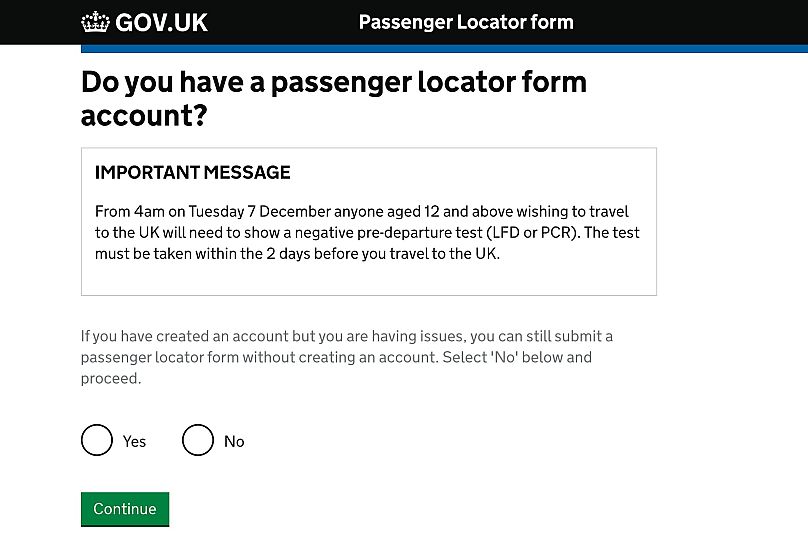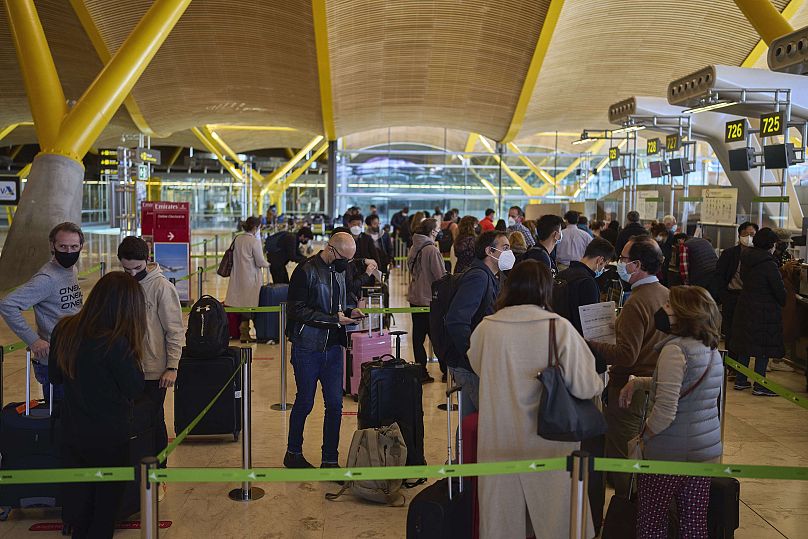With PLF forms being advertised for €85 and “scandalous” behaviour from test providers, how well do you know your travel admin?
Deciding whether to travel home or abroad this Christmas is a tough one. The new omicron COVID variant has made an obstacle course of even short flights. Plus ever-changing vaccine, testing and form-filling rules can be almost impossible to keep up with.
 ADVERTISEMENT
ADVERTISEMENT
 ADVERTISEMENT
ADVERTISEMENT
The last thing we need thrown into the mix are scammers. But unfortunately some individuals are seeing the confusion as a money-making opportunity.
Fake passenger locator forms are being advertised online, so people searching for the right forms to fill in often stumble onto a scammer’s page.
Legitimate companies have also been accused of dodgy practices. Some of the UK’s government’s approved list of PCR providers have been advertising their tests for as little as 95p (€1.12) online, when it’s near impossible to get one for this price.
With the UK now requiring pre-departure tests as well as day 2 PCR tests, there’s even more scope for travellers to be misled. The former chairman the Competition and Markets Authority (CMA), Britain's consumer watchdog, says the government should be doing more to keep PCR test providers in check.
“It appears that some of the worst practices: misleading online advertisements; overpricing; unacceptably poor service among them, are still widespread,” Lord Tyrie told the BBC.
Here we’ll be rounding up some of the common pitfalls out there.
What is a passenger locator form?
A passenger locator form (PLF) asks you for contact and accommodation details, plus other information like vaccination status. Each traveller needs to fill in a separate form, you can’t do one for the whole family, for instance.
They allow authorities to contact you if another passenger tests positive for the virus, as well as tracking who is coming in and out of the country.
PLFs are particularly important for tracing and containing the spread of new variants like omicron.
They were introduced early on in the COVID-19 pandemic and are now required by many European countries, including the UK.
How to make sure you don’t use a fake passenger locator form
A passenger locator form is - or should be - completely free. But fraudsters are using a few different tricks to make travellers part with their money.
Though the ‘passenger locator form’ site you find might be at the top of Google search results, check whether the listing is a ‘paid ad’ - pushed ahead of the official government page by a concoction of Search Engine Optimisation and cash. Czech Republic is one country where travellers have been targeted in this way.
UK consumer champion Which? also found evidence of companies falsely advertising their services to help you fill out a PLF - for as much as £72 (€85). The forms are, in fact, quick and simple to fill out.
Using misleading words like ‘official’, sites are advertising PLF assistance for the UK, Spain, Portugal, Greece, Italy and Turkey, despite all these countries having a free system on their government websites.
Tips for filling out passenger locator forms
Some countries stipulate when you need to fill in the form. For instance the UK requires you to fill it out in the 48 hours before you travel. Check on government websites.
Make sure you have your travel details, passport or ID and test booking, if you need one, on hand while you fill out the form.
For some countries, including the UK, you need to input your test booking reference in the PLF. Therefore you need to book your day 2 test before you can complete your PLF.
Check whether you need to print out your form, or whether you can show a digital copy on your phone.
COVID test companies breaching CMA rules
The UK's Competition and Markets Authority has been clamping down on some of the rogue companies making a profit out of the pandemic.
It recently sent letters to 25 PCR test providers warning them to review their terms and conditions, and other practices, or risk enforcement action.
Randox, one of the biggest testing companies, has had to remove terms that make it sound like customers aren’t entitled to compensation if things go wrong, plus their legal rights on cancellations and refunds have been clarified.
The CMA had already outlined unscrupulous practices in the summer, including firms that were advertising up-front prices for PCR tests which do not include additional charges; and advertising cheap PCR tests which are actually only available in small quantities or not at all.
But with the reintroduction of compulsory PCR (rather than antigen) day 2 tests for UK arrivals, some providers are back to their old tricks.
After Euronews Travel asked the CMA for clarity on 95p (€1.12) tests that were appearing at the top of the government’s approved list last week, several have disappeared.
There have also been reports of companies putting asterisks and numbers before their name in order to shoot to the top of the list when filtered alphabetically. Though this is a far cry from scamming, it still makes travellers’ lives harder when trying to choose the right test for them.
Investigations into two PCR providers - Dante Labs and Expert Medicals - are ongoing.
How to find the right - and cheapest - tests for travel
Again, government websites are the surest source of information on test requirements. Check to see whether you need a PCR test or if an antigen one is acceptable - as this could help save you some money.
Make sure you know the time frame in which you need to carry out the test. In the US this is now a day before departure (which is not the same as 24 hours). If you’re travelling from a remote location with few testing services, you may be able to get tested en route at a connecting airport.
Once you have booked your test, you should receive a confirmation email with a booking reference - this is the one you need to input on your PLF.












